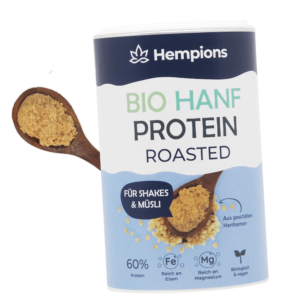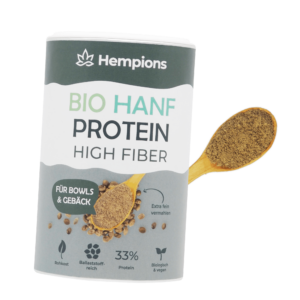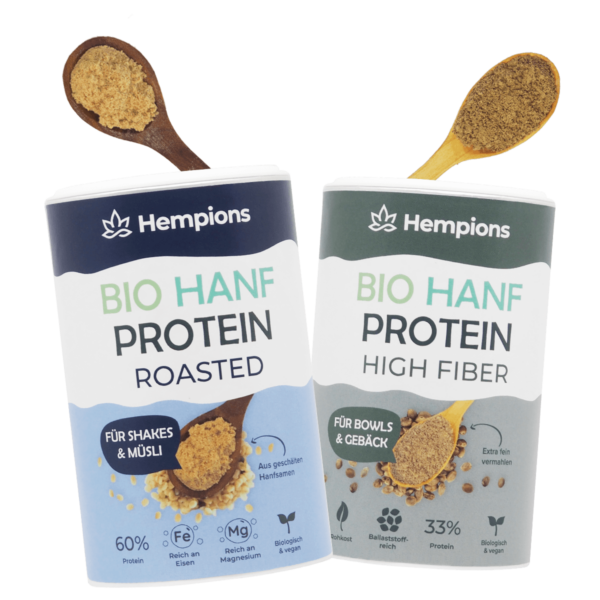Proteins, also called proteins, have many advantages. Some of them are that they:
- when losing weight and Help build muscle
- Protect the heart
- strengthen the immune system
- regulate the blood sugar level
In this article, we explain the advantages of Hemp Protein compared to other protein sources. We also explain the differences between Hempions Hemp Protein Roasted and Hemp Protein High Fiber.
Overview
- Why our body needs protein
- Comparison between hemp protein and other protein sources
- Differences between Hempions Hemp Protein High Fibre and Roasted
Proteins are the building materials for tissue (muscles, organs) and body cells. In addition, our body needs protein for the formation of hormones, enzymes and antibodies. Protein is important for concentration and memory because nerve cells and their communication channel (neurotransmitters) are formed from proteins. Because our cells are constantly renewing themselves, a sufficient protein intake is important for a healthy, efficient body.
Protein also boosts fat burning and metabolism. This is mainly because more calories are needed to burn protein than fats or carbohydrates.
The German Nutrition Society recommends:
- Adults should take 0.8 g protein/kg body weight daily: at 75 kg body weight this is 60 g daily.
- For children and people over 65, the recommendation is even about 1.0 g protein/kg body weight daily.
- For athletes, the daily requirement increases individually to 2.0 g protein/kg body weight or more. The requirement is particularly high when new tissue, i.e. muscles, are to be built up.
Hemp protein compared with other protein sources
In addition to the amount of protein, the quality of the protein source is of course also decisive. Essential points here are the proportion of:
- indispensable amino acids: protein components that the body cannot produce itself.
- essential fats such as omega-3 and omega-6
- Dietary fibre
- Vitamins, minerals and other vital substances
Composition of hemp protein compared with other protein sources
In addition to the high proportion of essential amino acids, hemp protein also contains all other amino acids. The complete composition of protein components ensures that our body can absorb hemp protein very well. This is shown by a comparison of the biological value of different protein sources. A high value stands for better usability in the human body:
- Whey protein: 104/100
- Chicken Egg: 100/100
- Hemp protein: 87/100
- Pork 85/100
- Soy protein 84/100
- Pea protein 56/100
In addition, how easily the protein can be digested is very important. For example, soy protein contains substances that inhibit the digestion of protein (trypsin inhibitors).
Hemp protein is free of lactose or gluten and is very similar to the protein of the human body. Thus, even compared to other protein sources, a very easy digestibility and compatibility is guaranteed.
Depending on the origin, residues of pollutants and medicines may be present in protein sources, which is why we generally recommend organic protein sources.
Vital fatty acids and fibre in hemp protein
Omega fatty acids in hemp protein are important for the health and performance of the brain, bones and joints. They even help to stay healthy in old age and with mental problems such as depression or ADHD. In contrast, animal protein sources often contain unhealthy fats that promote cardiovascular disease, among other things.
In addition, vegetable protein sources are generally rich in fibre. Fibre is important for digestion and intestinal health - and thus supports a strong immune system.
Minerals in hemp protein
Hemp protein contains important vital substances, including:
- Magnesium, which is important for cell structure. Without magnesium, the body cannot optimally process the supplied protein. Magnesium also supports muscle function and prevents cramps, for example.
- Iron, which is necessary for blood formation.
- Zinc, which is important for a strong immune system and defences.
The content of many minerals also ensures that hemp protein is basically digested alkaline.
Conclusion:
All in all, hemp protein is one of the most complete protein sources available to us. This is ensured by easily digestible, readily available protein as well as healthy fats, fibre and minerals (magnesium, iron, zinc). The multi-talent hemp protein thus replaces other food supplements.
Other sources of protein, however, do better in some respects.
A big advantage of hemp protein is that it is available regionally and in organic quality, which guarantees origin and quality.
Hempions hemp protein in comparison: roasted or high-fibre
At Hempions, we have two hemp protein varieties in our range. This allows us to better meet individual needs.
 |
 |
|
| Hemp protein roasted | Hemp Protein High Fiber | |
| Production | from hulled hemp seeds | from unhulled hemp seeds |
| Protein content | 60 g / 100 g | 33 g / 100 g |
| Fibre content | 12 g / 100 g | 38 g / 100 g |
| Fat | 17 g / 100 g | 8.6 g / 100 g |
Hemp protein roasted dissolves more easily in water. The fine, nutty flavour is particularly convincing in shakes.
Hemp protein high fibre is absorbed more slowly by the body. It supports digestion due to its high fibre content and is not as soluble due to the shell components.
The absorption of nutrients is optimal with hemp protein roasted because there is no hull content. The phytic acid contained in the husk can inhibit the absorption of zinc, but on the other hand has an anti-cancer effect.
Sources:
AGES - Agency for Food Safety: Protein as the building block of life
Briggs et al: Saturated fatty acids and cardiovascular disease: Saturated Fatty Acids and Cardiovascular Disease: Replacements for Saturated Fat to Reduce Cardiovascular Risk
Brusch et al: Omega fats in relation to joint health and arthritis: A new dietary regimen for arthritis: value of cod liver oil on a fasting stomach
German Nutrition Society: How much protein do we need
Jeffrey H Burton on the thermal effect of protein: on Researchgate
Kreugner, Horrobin: Essential fats in relation to bone health: Calcium metabolism, osteoporosis and essential fatty acids: a review
Omega-3 fats in relation to depression: on Pubmed
Thurnher, Alexander (2018) Heilender Hemf, Kneipp Verlag on biological value
Zamroziewicz et al: On healthy ageing and intelligence in relation to omega fatty acids: Determinants of fluid intelligence in healthy aging: Omega-3 polyunsaturated fatty acid status and frontoparietal cortex structure

